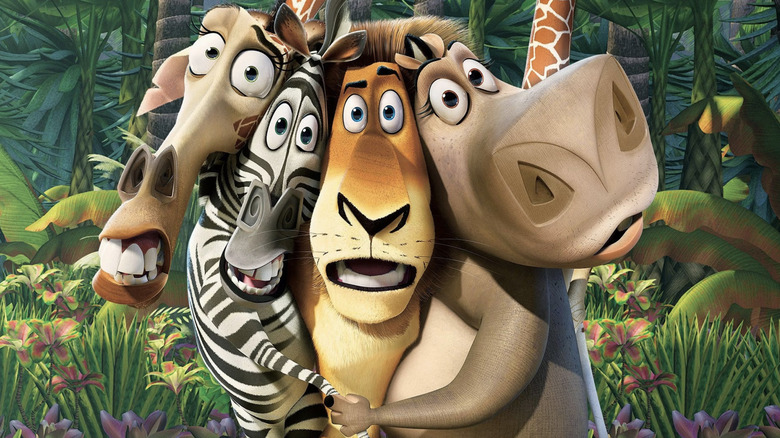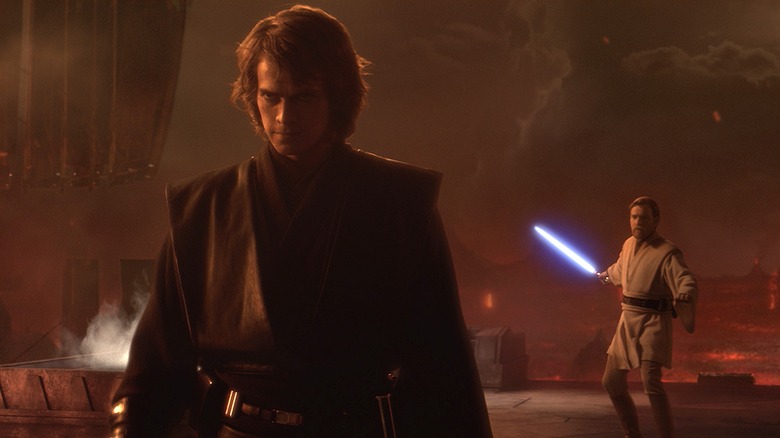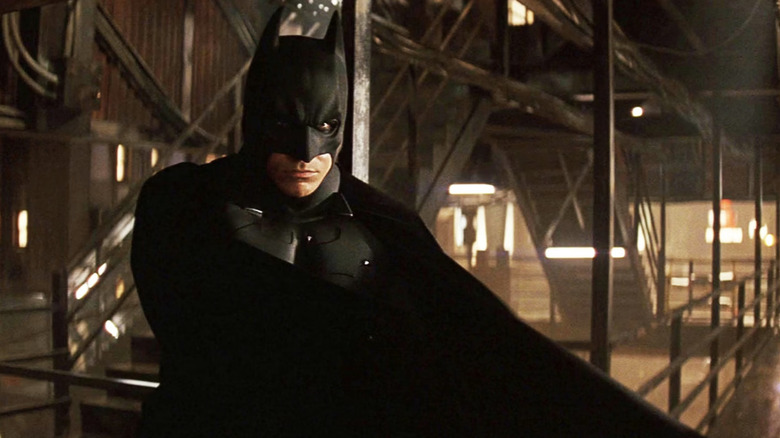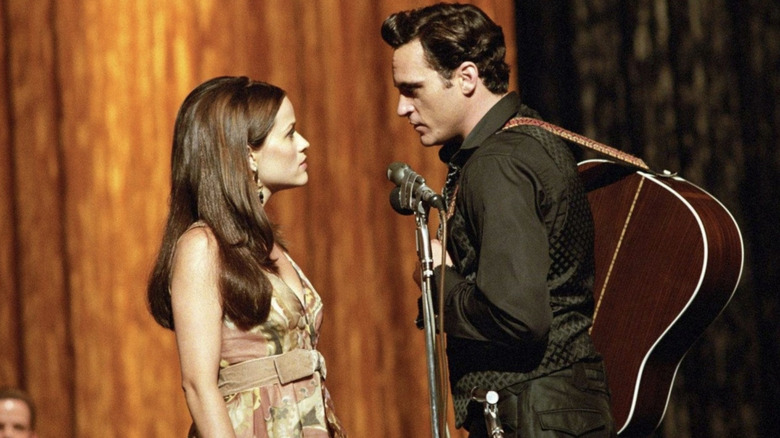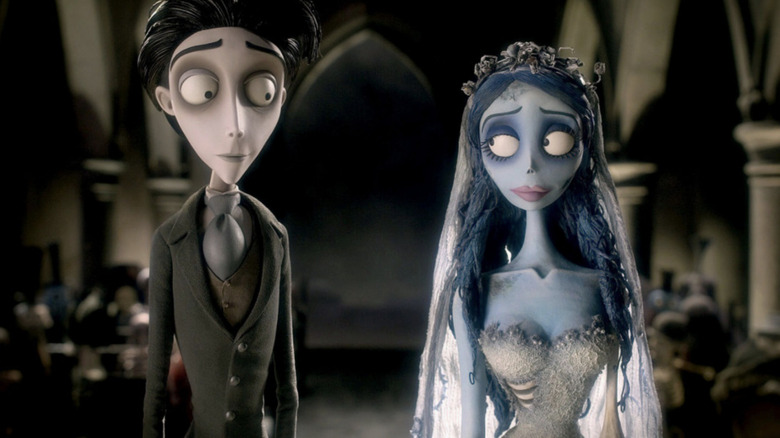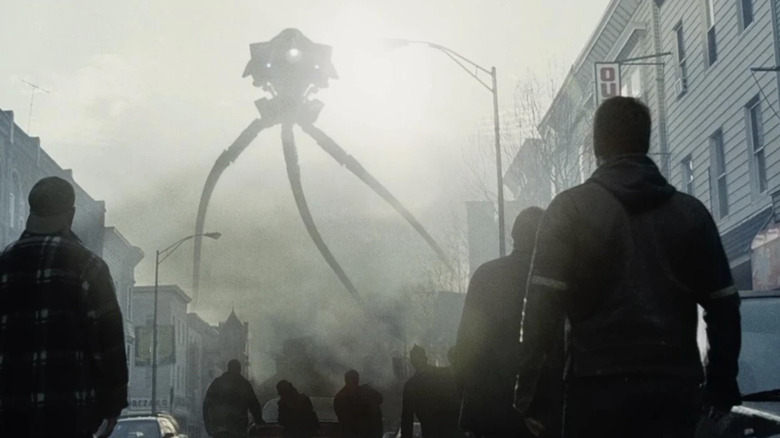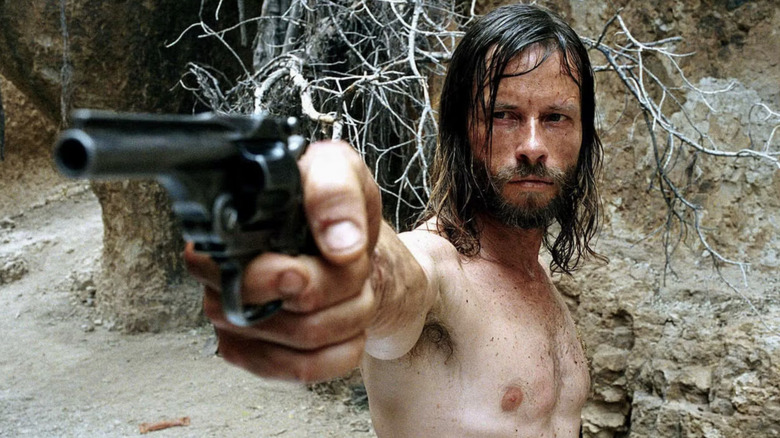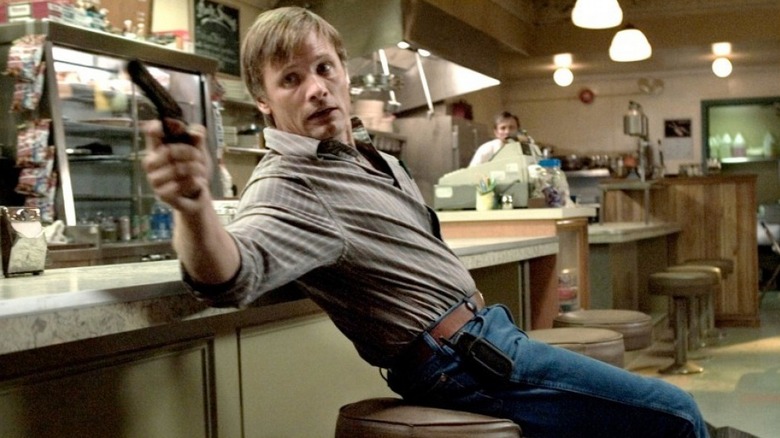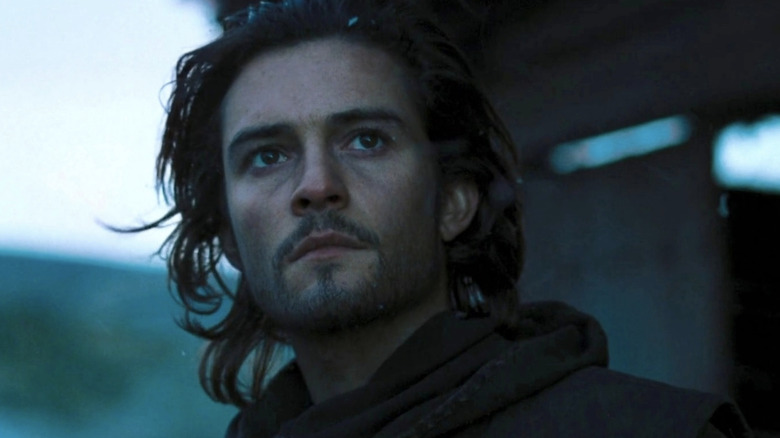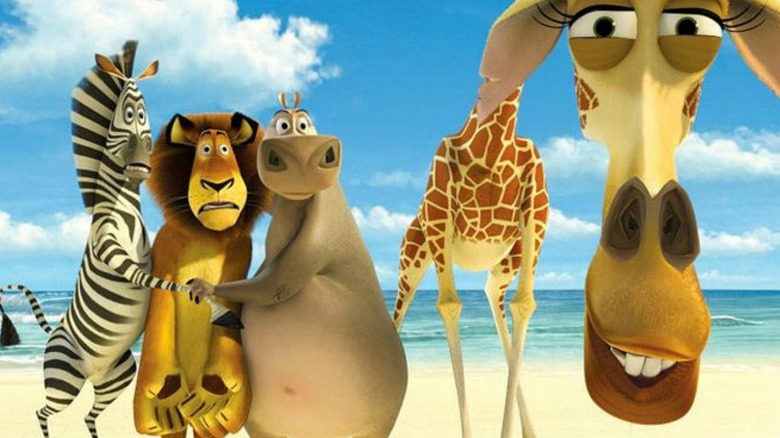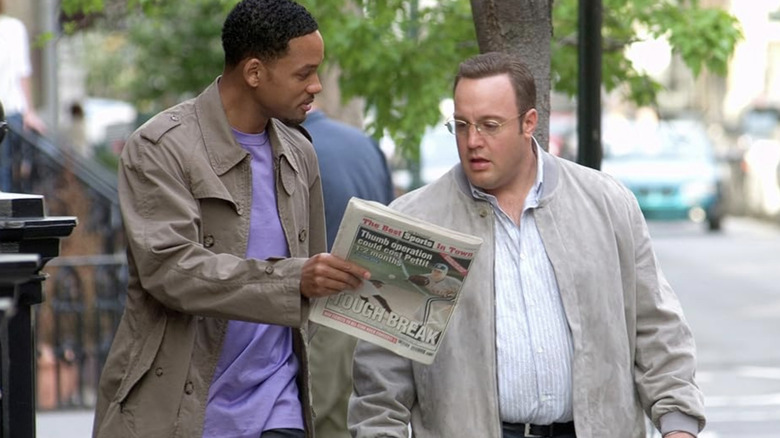10 Movies That Turned 20 In 2025 That Will Make You Feel Old
It's hard to believe that 2005 was 20 years ago, but, for better or worse, that's how time works. Whether you were still a kid back in the early 2000s or already an adult, it was a good year for movies that make us look back fondly. Franchises were built, and other sagas completed this very same year, one that featured plenty of other standalone projects that we've come to adore as well. Whether you're into superhero movies or rom-coms, historical epics or animated extravaganzas, 2005 had it all.
Of course, this is by no means an exhaustive list of 2005's motion pictures (we didn't even include "Harry Potter and the Goblet of Fire"), and there are several more we can think of off the top of our heads that would also do the trick as far as aging a person is concerned. But with these 10 films, we've tried to cover a wide range of movies that came out two decades ago. Some are based on comic books, some are true stories, and others take place on the other side of the world, — assuming you're reading this from America, that is.
So if you've been jonesing to take a trip down memory lane and return to a simpler (or, at least, less connected) time, then these are 10 films worth revisiting that'll make you feel just a little bit older, even if they've managed to age with grace.
Star Wars: Episode III - Revenge of the Sith
It was May 2005, and fans had been waiting for years to see how George Lucas would conclude his epic, six-part "Star Wars" saga. After the mixed reactions to "Star Wars: Episode I – The Phantom Menace" and the similar response to its 2002 sequel, "Star Wars: Episode II – Attack of the Clones," the third prequel film proved to be the charm. "Star Wars: Episode III – Revenge of the Sith" concluded the original "Star Wars" story and showed us Anakin Skywalker's (Hayden Christensen) tragic downfall, officially becoming Darth Vader. Not only does "Revenge of the Sith" round out the trilogy with a serious bang, but it revealed George Lucas' vision for this faraway galaxy in the grandest way possible.
Compared to its predecessors, the special effects still hold up nicely. The opening space battle remains one of the greatest in the franchise and is only made more epic by John Williams' incredible score. And that's not to mention how great the lightsaber fight between Anakin and Obi-Wan (Ewan McGregor) still looks. While "Episode III" proved not to be the end of the greater "Star Wars" saga, that's exactly how it was sold to us back in '05. George Lucas didn't make any more "Star Wars" movies after "Revenge of the Sith," and though "Star Wars: The Clone Wars" would bridge the gap between the second and third prequels a few years later, "Episode III" was considered the official end of the saga for nearly a decade.
Batman Begins
After a few smaller hits in the early 2000s, such as "Memento" and "Insomnia," up-and-coming filmmaker Christopher Nolan was handed the keys to the Batmobile with 2005's "Batman Begins." A franchise reboot following Joel Schumacher's poorly received "Batman & Robin," Nolan took the Dark Knight in a grittier direction more akin to comics like "Batman: Year One" than the '60s Adam West television series. "Batman Begins" — which starred Christian Bale as Bruce Wayne/Batman — proved to Hollywood and audiences alike that the Dark Knight had plenty of life left in him and that the DC Comics character could be done justice on the big screen. It worked out for Nolan, too, launching the director higher than ever before into the public eye.
It's hard to believe that the first entry in "The Dark Knight" trilogy was released 20 years ago, but revisiting the film even now feels just as dynamic as when it first hit theaters. Of all three of his Batman films, "Begins" is Bale at his best. We see Bruce not only as a crime-fighting vigilante but also as Gotham City's lost and wayward son, unsure what his future holds or how to overcome his own personal tragedy. As we watch him become a hero, we too are energized by his altruistic quest. It's no wonder all of Gotham is inspired by Batman at the end of 2012's "The Dark Knight Rises." Particularly compelling is Bale's chemistry with Liam Neeson, who plays Bruce's mentor-turned-adversary, R'as al Ghul. Their battle on literal thin ice is one of the coolest moments ever seen in a Batman movie.
Walk the Line
As far as musician biopics are concerned, there are few better than James Mangold's "Walk the Line." Likewise released in 2005, the Johnny Cash biopic begins in the late 1940s as the future country music star (played perfectly by Joaquin Phoenix) holds himself responsible for a family tragedy he could never quite get over. From there, we jump to the '50s and later the '60s (when the picture is primarily set) as Johnny finds both fame and fortune in the music industry. Like so many other musicians of the day, Johnny's battle with drugs is especially powerful, and it takes a romance with June Carter (Reese Witherspoon) to help pull him out of the throes of addiction. While "Walk the Line" doesn't tell the full Johnny Cash story, it does explore one of the darkest periods in the Man in Black's personal history.
Aside from being a gripping drama, "Walk the Line" features plenty of musical numbers straight out of Cash's discography. Phoenix mimics the country icon's vocals impressively well, and Witherspoon blows June Carter's songs out of the park. It's no wonder that Witherspoon earned an Oscar for her role. While there have been plenty of musical biopics in recent years, "Walk the Line" remains an exceptional motion picture that highlights not just one of the best musicians of the 20th century, but also emphasizes how powerful Joaquin Phoenix and Reese Witherspoon are as performers themselves. This one also marked the beginning of James Mangold's fascination with Johnny Cash, which would continue into his 2017 film, "Logan."
Tim Burton's Corpse Bride
The beauty of an animation style like stop-motion is that, even if the film itself has a few years on it, it doesn't age the same way as traditional or computer-generated animation. "Tim Burton's Corpse Bride" is a perfect example of this. You might not realize that this one is now 20 years old, but as Burton's third stop-motion adventure — after "The Nightmare Before Christmas" and "James and the Giant Peach" — it's one of his most notable films to date. Starring frequent Burton collaborators Johnny Depp and Helena Bonham Carter, "Corpse Bride" is a mix between a horror and fantasy story about a young man (Depp) who accidentally commits to a young revenant who has it in her mind to marry the Victorian-era suitor.
This wild ride of an adventure could only be brought to life by a filmmaker of Burton's caliber, even if he did co-direct with Mike Johnson. Not your usual folktale, "Corpse Bride" will stick with you long after the credits roll (or enter the Land of the Dead, whichever comes first). With memorable musical numbers that highlight the genius of the premise, plucky Burton-esque characters who feel increasingly familiar, and a host of stop-motion antics that still look great decades later, "Tim Burton's Corpse Bride" is one you won't forget. Even if its 20th anniversary makes you feel a bit older than you'd like, there's a lot to still love about this undead tale.
War of the Worlds
Though H.G. Wells' "The War of the Worlds" had been around for decades beforehand, it wasn't until 2005 that Steven Spielberg decided to tackle a blockbuster adaptation of the novel. Replacing 1800s England with 21st-century America and casting Tom Cruise as his sci-fi hero, Spielberg brought the classic tale to life in an inventive new way that impressed critics at the time of release. And rightfully so, as this alien invasion picture deviates enough from the original story to keep things interesting, with modern effects bringing the invaders to life. It's a pulse-pounding thriller that pits Cruise's Ray Ferrier and his family against the impending Martian threat, alien invaders that are, in their way, even scarier than the Facehuggers from "Alien."
While "War of the Worlds" is neither Spielberg's nor Cruise's most notable picture, it's still a daring collaboration that brings out the best in both. We can see the "Saving Private Ryan" director's distinct style in the initial attack wave spearheaded by the alien tripods as clearly as we can see Cruise's lust for adventure as he rummages through the hellish, war-torn (mostly) New England landscape. That scene where Ray walks through the wreckage of an airliner is still as eerie as ever, and it's no wonder that the crash site is still included as a stop on the Universal Studios Tour. Given that "War of the Worlds" was one of the highest-grossing pictures of '05, it's one worthy of remembering.
The Proposition
While most Westerns are traditionally set in the Wild West of the United States, sometimes these stories take place on the other side of the globe. In the case of 2005's "The Proposition," audiences are taken down under to 1880s Australia following a gunslinger (Guy Pearce) who's forced to make a dangerous choice: kill one brother in order to save another. Directed by John Hillcoat from a screenplay by musician Nick Cave, who made quite the impact with this non-traditional horse opera, this is one haunting motion picture. Famed film critic Roger Ebert went so far as to call this feature "a movie you cannot turn away from," deeming it both "pitiless" and "uncompromising." It's no wonder it served as one of the major inspirations for the video game "Red Dead Redemption."
But when the film was released, "The Proposition" only played in Australia, making this one a bit of a cheat. It didn't technically get a release in America until May 2006, but considering the film has its roots in '05, we couldn't ignore it. A melancholy and violent picture, "The Proposition" shows the harshness of both the untamed outback country and the brutality of colonialism, all wrapped up in a narrative that's ultimately about love and family, however tragic that may be. There's a lot more to this film than a simple revenge story, and Pearce's performance offers us a unique glimpse into an often unexplored portion of the late 19th century.
A History of Violence
2005 was quite a year for comic book movie adaptations. In addition to "Batman Begins," both "Sin City" and "V for Vendetta" hit theaters in '05, as did "Fantastic Four," "Elektra," and "Constantine." But perhaps the most dramatic of these was "A History of Violence," a film based on the graphic novel of the same name by John Wagner and Vince Locke. The film stars Viggo Mortensen as Tom Stall, an Indiana-based diner owner and family man who just so happens to actually be a former hitman who left the Philadelphia mob behind years ago.
Directed by body horror filmmaker David Cronenberg, "A History of Violence" isn't for the faint of heart, but its meditations on humanity's own struggle with the concept are utterly fascinating. No, it's not your traditional comic book movie with superheroes and superpowers, but it's one of the most profound movies to ever be adapted from the world of comics.
As one of the last motion pictures to ever be released on VHS as DVDs and then Blu-rays took over home video, one might expect "A History of Violence" to feel a bit more dated. And yet, its timeless message is one that feels as relevant as ever. In fact, Viggo Mortensen was so impressed with the film that, nearly a decade later in 2014, he told The Hollywood Reporter that, "If not the best, it's one of the best movies I've ever been in." Considering he was one of the leading men in Peter Jackson's acclaimed "The Lord of the Rings" trilogy, that's some seriously high praise.
Kingdom of Heaven
Speaking of "Lord of the Rings" stars, 2005 also saw Orlando Bloom make his own mark on Hollywood outside from the major franchises he'll be forever associated with. Playing Balian of Ibelin in Ridley Scott's historical epic, "Kingdom of Heaven," Bloom shines as a Crusader who wrestles with his own faith and conscience as he heads to the Holy Land of Jerusalem. Filled with a number of historical figures, including Liam Neeson's Barisan "Godfrey" of Ibelin and Edward Norton's King Baldwin IV of Jerusalem, the film takes an interesting turn by deconstructing some of the religious notions and ideas its heroes fight for. While the theatrical cut is good, it only scratches the surface of what Scott was aiming for; his four-hour director's cut is infinitely better, and feels a bit more complete.
The film on this list that was panned most by critics, "Kingdom of Heaven" developed a cult following in later years. Though not Bloom's most popular film, it's also not easily ignored. If you loved "Gladiator," then this is a must-see historical epic, a movie that offers a fascinating look at the violent conflict between Christians and Muslims in the 12th century. Though the subject matter was certainly relevant in the early 2000s, 20 years later, "Kingdom of Heaven" feels even more so, especially given the message at the end. "Nearly a thousand years later," the film suggests, "peace in the Kingdom of Heaven still remains elusive."
Madagascar
Who doesn't love a good animated adventure? If you were a kid in 2005, then there's no way you didn't see "Madagascar." In fact, if you were anything like this author, the animated feature is probably how you learned that Madagascar (the island republic) existed in the first place. Starting out as the main attractions at the Central Park Zoo, lion Alex (Ben Stiller), zebra Marty (Chris Rock), hippo Gloria (Jada Pinkett Smith), and giraffe Melman (David Schwimmer) suffer a rude awakening when they're accidentally transported to an island on the other side of the world. Over the course of their quest to return to NYC, this band of not-so-merry friends (well, besides Marty) learns to adjust to their new surroundings and is forced to survive in the wild — a big change from the life of luxury they'd become accustomed to.
Not only is "Madagascar" one of the funniest kids movies of the era (with some jokes only adults notice), but it's made even more memorable by an incredible cast who thrive in their roles. David Schwimmer as a hypochondriac giraffe is an inspired choice, and Ben Stiller and Chris Rock as best friends existing on opposite ends of the food chain is comedy gold. But beyond our four favorite animals, the island also features a group of militaristic penguins, the lemur King Julien (Sacha Baron Cohen), and plenty of other critters who make the DreamWorks film a gem to remember. No wonder this one spawned a franchise of its own, full of sequels and spin-offs that have kept this band of misfits alive and out in the wild.
Hitch
Speaking of comedy, if you were hoping for a more more mature yet funny adventure set in good old 2005, then Will Smith's "Hitch" is probably the movie for you. While not your traditional romantic comedy, there's plenty of both to be found here as Smith plays Alex "Hitch" Hitchens, a professional "date doctor" whose only goal is to help his clients "get the girl." That's how he is introduced to Albert Brennaman (Kevin James), a man who has fallen for his own client, Allegra Cole (Amber Valletta). But despite his professional success, Hitch struggles to maintain any genuine relationships himself until he falls for a gossip columnist, Sara Melas (Eva Mendes). Of course, none of his usual charms work on Sara, and he struggles to make any genuine connection with her.
Revisiting "Hitch" today is still a good time. It's a bit dated, sure, and some of it doesn't age well, but there's a heartwarming tone to the film that's still endearing two decades later. The chemistry between Smith and James is undeniable, and watching the former attempt to woo Mendes is particularly enjoyable, no matter how many times you've seen the film. Their romance in the face of his strange sort of "consulting" makes you root for Hitch even when we maybe shouldn't. While it may not be the best movie to come out of 2005, it's one that continues to stick with you all these years later.
